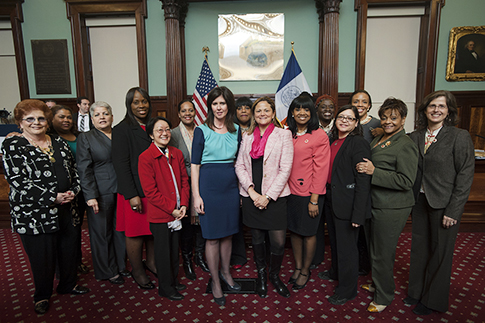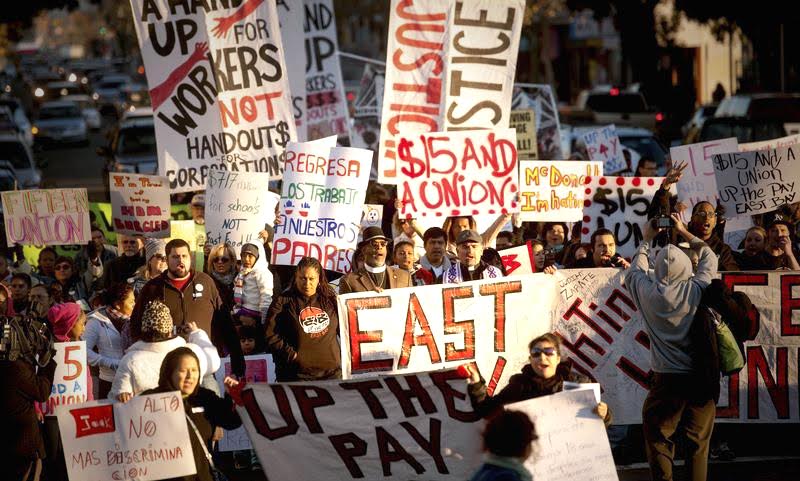Toward Progress on Equal Pay Day

The City Council Women's Caucus, including two authors (photo: William Alatriste)
Today - Tuesday, April 12 - New York City recognizes Equal Pay Day – a day to confront the challenges our mothers, daughters, and sisters still face in achieving workplace equality.
Significant progress has been made, but substantial discrepancies exist between women and men – most notably, a sizable wage gap. As of 2013, women still earned only 78 cents for every dollar earned by men, with a median income over 27 percent lower than that of men. For women of color, the pay gap widens: black and Hispanic women earn 64 and 56 cents on the dollar, respectively. Stretched over a lifetime of work, this leaves women with much less money than the average man.
At S&P Fortune 500 companies, women hold less than 5 percent of CEO positions and only 16 percent of board seats. When women are top earners, the pay gap tends to close at a faster pace. But disappointingly, the numbers show that women are vastly underrepresented in these higher-level positions, resulting in a persistent pay gap and lack of diversity in board rooms big and small.
Yet, women are more educated and prepared for the workforce than ever before. Women now account for nearly 60 percent of annual four-year university graduates, 60 percent of master’s degrees, and 52 percent of doctorates being awarded in the United States.
Though the longstanding pay gap is an undeniable social injustice; it amounts to much more, and is actually hurting corporate bottom lines.
Study after study, particularly those from Catalyst, the global expert on accelerating progress for women through workplace inclusion, has stated that when women hold leadership or board positions, it improves company financial performance, economic growth, productivity, and profitability. This makes it crystal clear that business is better and companies perform most effectively when they bring equal opportunity, allowing everyone a seat at the table.
The City of New York, as the global center of business and commerce, and proprietor of billions in private contracts, can play an important role in promoting the levels of diversity we need in the 21st century. Let’s make sure we get the best value for our own tax dollars, and promote businesses that promote equal opportunity.
Last week, the City Council voted and passed Introduction 704-A, a bill we sponsored to gather more information on the gender and racial makeup of the individuals who make up executive-level staff and boards of companies that do business with the City. Once signed into law, it will require the Department of Small Business Services to survey companies that do business with the City and obtain the demographics of companies’ executive-level staff and board members.
In 2015, the City procured $13.8 billion worth of goods and services through more than 60,000 transactions, yet we do not know who is running the companies that are conducting this business. Our new law will provide the City with the data it needs to ensure that city-contracted companies are promoting the diversity that makes this City so great, and could ultimately boost the economy.
It’s a small step that we believe will go a long way to help our City recognize inequities in our own front yard and create incentives for businesses throughout New York to promote diversity in their top ranks.
We hope you will all join us today in the fight for equal opportunity, equal pay, and a New York City where everyone can succeed.
***
Elizabeth Crowley and Darlene Mealy are New York City Council Members; Deborah Gillis is President & CEO of Catalyst.
***
Have an op-ed idea or submission for Gotham Gazette? Email This email address is being protected from spambots. You need JavaScript enabled to view it.
Forget the Brooklyn Presidential Debate, the Real Battle is New York State

Albany of yesteryear (photo via The Governor's Office on flickr)
With an April 14 date set for the Clinton-Sanders Brooklyn debate, New York and Kings County are now center stage in the ever-engrossing presidential election. Though bringing the ninth Democratic presidential debate to Brooklyn might help New Yorkers become more informed voters, it also sadly serves as a timely distraction from the latest setback to progressive governance reforms in the Empire State.
Thanks to the exclusion of any government ethics reform measures in the state budget deal reached last week, New Yorkers will continue to live in a state that offers public pensions for longtime legislators turned felons, loopholes for special interest groups to funnel millions into local campaigns, and no limits on outside income for our part-time legislators.
With wealthy donors this free to inject money into politics, it's easy to understand why in the last decade over 40 New York lawmakers have been arrested or left office after being accused of impropriety, including a notable few from Brooklyn. As such, it’s also not much of a surprise that the Center for Public Integrity has given New York State a D- in its State Integrity Investigation and consistently ranks New York among the worst for government accountability and transparency nationwide.
When the presidential candidates debate national politics in our borough, let’s hope they remember that all politics are ultimately local. If Senator Sanders is committed to taking money out of politics, there are plenty of easy targets right here in New York. If Secretary Clinton cares about building trust with voters, she could be served well by demanding an ethics package in her own state.
New Yorkers are frustrated with business as usual in Albany—a sentiment easily seen in abysmal voter turnout numbers. While a Brooklyn debate will help both campaigns excite their supporters in time for the April 19 primary, supporting reforms to the state’s election laws would ensure that New York voters have their voices heard in all elections.
Common sense reforms like online voter registration, early voting, and same-day party enrollment are commonplace in other U.S. states but denied to New York voters. These reforms would not only increase voter participation for working families but help newer residents still registered in their long-abandoned “home” states have a voice in electing their representatives.
Brooklyn is home to a strong Democratic majority and some promising progressive leaders but we’ve been “led” by entrenched political powers for much too long.
New York and Kings County can become more democratic, but this can only happen through ongoing political engagement on the local level. Before we start celebrating public debates between national candidates in our community, let’s demand public conversations on decision-making in New York State, a modernized electoral system, and state ethics rules with teeth. Whether we vote for our first democratic socialist president or first female president in New York’s primary, let’s not let the revolution stop there.
***
by Anusha Venkataraman and Rodrigo Camarena on behalf of New Kings Democrats, a progressive, grassroots political organization committed to bringing transparency, accountability, and inclusionary democracy to the Kings County Democratic Party.
***
Have an op-ed idea or submission for Gotham Gazette? Email This email address is being protected from spambots. You need JavaScript enabled to view it.
An Imperfect Victory for New York Workers

Millions of New Yorkers are celebrating a deal this week to raise the state’s minimum wage. The deal puts a better future in sight for families around the state and sends a powerful signal to other states considering wage hikes of their own.
The deal is a testament to the power of organizing. Today’s headlines would be unimaginable just a few years ago. When New York Communities for Change organized the first fast food worker strike – almost four years ago – people thought we were crazy.
As the federal government repeatedly stalled on a meaningful increase to the nationwide minimum wage, it seemed that higher wages were out of reach.
In response, fast-food and other low-wage workers rose up to fight for better wages and a better quality of life, sparking a movement that spread to cities and towns across the nation.
It is no coincidence that the Fight for $15 began right here in New York City. The level of inequality in our city has long been one of the worst of the country – and has grown to historic proportions in recent years.
According to a 2014 Census Bureau survey, the top 5 percent of Manhattan households made 88 times as much as the poorest 20 percent. And as of last year, workers earning minimum wage could not afford median rent in a single neighborhood in New York City.
Wages have long failed to keep pace with the growing cost of living. In fact, the Economic Policy Institute found that the statewide wage of $9.00 per hour was well below what it would be if it had simply kept pace with inflation since 1970. The same study found that, accounting for both inflation and a higher cost of living, the minimum wage today would match its 1970 value if it reached $14.27 per hour this year – nearly the level agreed on by the New York State Legislature.
Governor Cuomo made the right move last year by mandating higher wages for fast-food workers – those on the front lines fighting for reform. But leading industry by industry risked neglecting too many workers. In order to truly create change, the rules must apply equally to everybody. Last week’s deal did that, letting workers across the economy finally dream bigger than the next paycheck.
The deal is a victory for New York City workers. However, it bypasses hard-working families in Upstate New York. While over a million low-wage workers in the city will see their wages rise to $15 per hour by the end of 2018, those in Long Island will only reach $15 in almost six years and those upstate will need to wait five years only to reach $12.50. Although the deal allows wages to rise to $15 after that, the rate will depend on review and inflation and could take years.
It is a painfully long stretch given the growing cost of living north of the city. The New York State Comptroller, for example, has found housing costs skyrocketing, with at least one in five people in every county – including those far upstate like Warren and Monroe – spending more than a third of their salary on rent. In some counties half of residents must spend that much. With added expenses like utilities and food, it leaves little room to save up for college or retirement.
It is imperative that legislators now finish the job and give all New Yorkers a chance at a living wage.
Just days before Albany finalized its deal; California showed us that a $15 wage statewide is possible. Our state must fulfill the promise of Fight for $15 statewide and let all workers adequately provide for themselves and their families. Otherwise New Yorkers will continue doing what they have been doing for almost four years: risking everything to provide a better life for their families.
***
JoEllen Chernow is Director of Economic Justice at Center for Popular Democracy. Jonathan Westin is Executive Director of New York Communities for Change. On Twitter: @popdemoc and @nychange.




